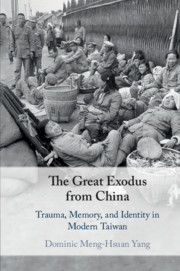Book contents
- The Great Exodus from China
- The Great Exodus from China
- Copyright page
- Dedication
- Contents
- Figures, Maps and Tables
- Acknowledgments
- Note to the Reader
- Abbreviations
- Maps
- Introduction
- 1 The Exodus
- 2 Wartime Sojourning
- 3 Cultural Nostalgia
- 4 The Long Road Home
- 5 Narrating the Exodus
- Epilogue
- Bibliography
- Index
5 - Narrating the Exodus
Published online by Cambridge University Press: 12 September 2020
- The Great Exodus from China
- The Great Exodus from China
- Copyright page
- Dedication
- Contents
- Figures, Maps and Tables
- Acknowledgments
- Note to the Reader
- Abbreviations
- Maps
- Introduction
- 1 The Exodus
- 2 Wartime Sojourning
- 3 Cultural Nostalgia
- 4 The Long Road Home
- 5 Narrating the Exodus
- Epilogue
- Bibliography
- Index
Summary
Not long after the mainlanders returned to Taiwan from their disappointing hometown visits in China, they experienced another form of shock and disorientation. Chapter 5 examines this “social trauma of the homecoming in Taiwan.” Following the island’s democratization, the previously suppressed local majority population, the native Taiwanese, began to denounce the mainlanders as a privileged minority group of “foreign colonizers” associated with Chiang Kai-shek’s military dictatorship. In response to this wholesale stigmatization and also in response to their earlier disillusionment with their Chinese homeland, the mainlanders began to openly promote their family stories of trauma and displacement related to the great exodus. This was done to present themselves as refugees escaping from a brutal war in China who later found home in Taiwan. Second-generation mainlanders played a critical role in constructing this new mnemonic regime that made their parents’ expulsion from the mainland into the “cultural trauma” of contemporary mainlander community. The chapter also goes back in time to explore how the exodus had been portrayed in selected state-sponsored texts and popular social texts before democratization. It identifies stories about the old soldiers and military families’ villages produced in the 1970s and 1980s as important precursors to present-day developments.
Keywords
- Type
- Chapter
- Information
- The Great Exodus from ChinaTrauma, Memory, and Identity in Modern Taiwan, pp. 214 - 258Publisher: Cambridge University PressPrint publication year: 2020



